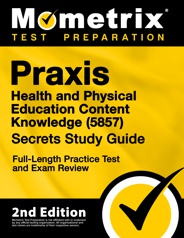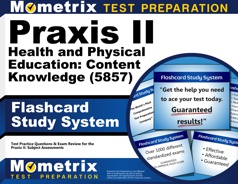The Praxis Health and Physical Education: Content Knowledge (5857) exam is a test used to evaluate the knowledge and skills of prospective entry-level K-12 health and physical education teachers.
Click “Start Test” above to take a free Praxis Health and Physical Education practice test!
Exam Outline
This exam contains 130 selected-response questions and has a time limit of 130 minutes. There are several different forms of selected-response questions, any combination of which may appear on the exam:
- Single-selection multiple-choice
- Hot spot
- Drag-and-drop
- Numeric entry
- Drop-down
- Sentence selection
The exam is organized into two main parts, Health Education and Physical Education, and is further split into five content categories.
Health Education
The questions in this category are grouped into two areas:
Health Education as a Discipline
- Reliable and valid sources of data
- Appropriate educational materials that meet the needs of diverse groups
- Major health behavior theories
- Curricular and extracurricular programs for student health needs
- Health-related data
- Assessment tools for determining school health needs
- Professional, ethical, and legal practices
- Continuing education
- Effective communication
- Physical growth and development
- Character education
Health Instruction
- Aligning curriculum with district, state, and national standards
- Reflective teaching process
- Assessing learning needs for groups and individuals
- Classroom management
- Sequential instruction planning
- Effective implementation of instruction
- Assessing student learning
II. Health Education Content (32 questions)
The questions in this category are grouped into three areas:
Health Promotion and Prevention of Injury and Disease
- Nutrition
- Disease etiology
- Disease treatment and management
- Stress management and coping skills
- Research on chronic and communicable disease prevention
- Personal hygiene
- Goal-setting and decision-making for healthy lifestyles
- Effects of substance use and abuse
- Anatomy, physiology, and body system interrelationships
- Injury and sudden illness care
Healthy Relationships/Mental and Emotional Health
- Issues related to human sexuality
- Effects of decision-making on relationships
- Different types of abuse and violence
- Interpersonal communication
- Various mental and emotional health issues and prevention strategies
- Psychosocial development throughout life
- Healthy interaction skills
Community Health and Advocacy
- Health-related careers
- Environmental health issues
- Delivering appropriate health-promoting messages
- Consumer health issues
- Individual responsibility to society and the environment
- Factors of decision-making in health policies
- Valid sources of health information, services, and products
- Role of the health educator as a liaison between school staff, students, parents, and the community
- Community health agencies available for referral and assistance
- Health education advocacy opportunities
Physical Education
The questions in this category are grouped into two areas:
Core Concepts
- Exercise physiology
- Liability and legal considerations relating to equipment use, program selection, supervision, and class organization
- Principles of biomechanics and kinesiology
- Current and historical issues, trends, and developments in physical education
- Basic science terminology
- Basic science principles, concepts, and applications
- Effects of substance abuse on student health and performance
- Knowing the skills, rules, strategies, concepts, and techniques pertaining to movement activities
- Movement concepts
- Anatomy and physiology
- Exercise physiology
Student Growth and Development
- Developmental readiness to learn and refine movement patterns and motor skills
- Sequential and developmentally appropriate practice and learning opportunities
- Use of appropriate professional support services and resources
- Monitoring of individual and group performance
- Perception in motor development
IV. Management, Motivation, and Communication/Collaboration, Reflection, and Technology (29 questions)
The questions in this category are grouped into five areas:
Management and Motivation
- Organization and management of resources
- Effective behavior management plans
- Motivation of students to participate in physical activities
- Psychological and social factors that affect learning
- Promotion of positive relationships
- Establishing a productive learning environment
Communication
- Appropriate and specific feedback regarding student learning, skill acquisition, and motivation
- Respectful and considerate communication
- Effective verbal and nonverbal communication skills
- Communication of classroom management
Collaboration
- Integration of knowledge and skills from multiple subject areas
- Promotion of physical activity opportunities
- Educational issues that cross subject matter boundaries
- Support of student growth and well-being via the establishment of productive relationships
Reflection
- Development and growth as a reflective professional by using available resources
- Facilitation of change by using the reflective cycle
Technology
- Communication, instruction, networking, information presentation, recordkeeping, and resource allocation by using technologies
- Student learning activities that integrate information technology
V. Planning, Instruction, and Student Assessment (21 questions)
The questions in this category are grouped into two areas:
Planning and Instruction
- Enhancing skill development by providing feedback
- Teaching of physical activity, skillful movement, and fitness via a wide variety of means
- Current issues and laws affecting physical education activities
- Basing unit and lesson plans on national, state, and local standards
- Identification and implementation of appropriate goals and objectives
- Provision of feedback to enhance the development of skills
- Sequencing of motor skill activities to improve learning
- Safety and injury prevention guidelines
- Linking physical activities to learning experiences
Student Assessment
- Understanding fitness assessments
- Ways of interpreting assessment results
- Assessment of skill performance and fitness
- Types of assessments and methods
- Appropriate assessment techniques
- Student involvement in peer assessment and self-assessment
- Referral procedures
- Gathering and assessing student learning data
Check Out Mometrix's Praxis Health and Physical Education Study Guide
Get practice questions, video tutorials, and detailed study lessons
Get Your Study Guide
Registration
To register for the Praxis Health and Physical Education exam, you will need to create an online account with ETS. Through this account, you can submit an application to take the exam.
During registration, you will be asked to select the test-taking format (remote or at a testing center), test location (if you are taking the test at a testing center), and test date. You will also need to pay the $130 exam fee.
Test Day
In-person Testing
On the day of your testing appointment, you should arrive at the testing center 30 minutes before the scheduled time (this will allow time for the check-in process). When you arrive, you will be asked to show your admission ticket and two forms of valid identification, one of which must be a valid, government-issued photo ID.
Personal items will not be allowed into the testing center, so it is best to leave things like bags, notebooks, and food items at home or in your car.
Once the check-in process is complete and you are fully approved for testing, you will be led to the testing station and receive a piece of scratch paper for notes.
Remote Testing
To take the exam remotely, you must use a laptop or desktop computer. Tablets, smartphones, or any other touchscreen devices are prohibited. You will also need a webcam, speakers, and a microphone, whether internal or external.
Before exam day, you will need to download and install the ETS Secure Test Browser on your computer.
When you check in, the remote proctor will ask you to show proof of identification and to move your webcam around the room so that your testing area can be observed.
Once the proctor has approved your testing area, they will walk you through the testing process and begin your exam.
How the Exam is Scored
Your score is based on your raw score, which is the number of questions you answer correctly. The raw score is then converted to a scaled score. The scaled score you need to obtain differs slightly depending on which state you take the exam in, but the passing score is generally 160.
You should receive an official score report about 5 weeks after testing.
Check Out Mometrix's Praxis Health and Physical Education Flashcards
Get complex subjects broken down into easily understandable concepts
Get Your Flashcards
FAQs
Q
How many questions are on the Praxis Health and Physical Education (5857) exam?
A
There are 130 selected-response questions on the exam.
Q
How long is the Praxis Health and Physical Education (5857) exam?
A
The time limit for the exam is 130 minutes (2 hours and 10 minutes).
Q
What is the passing score for the Praxis Health and Physical Education (5857) exam?
A
The passing score differs depending on which state you take the exam in. In most states, to pass the exam, you must achieve a minimum scaled score of 160.
Q
How much does the Praxis Health and Physical Education (5857) exam cost
A
The examination fee is $130.

